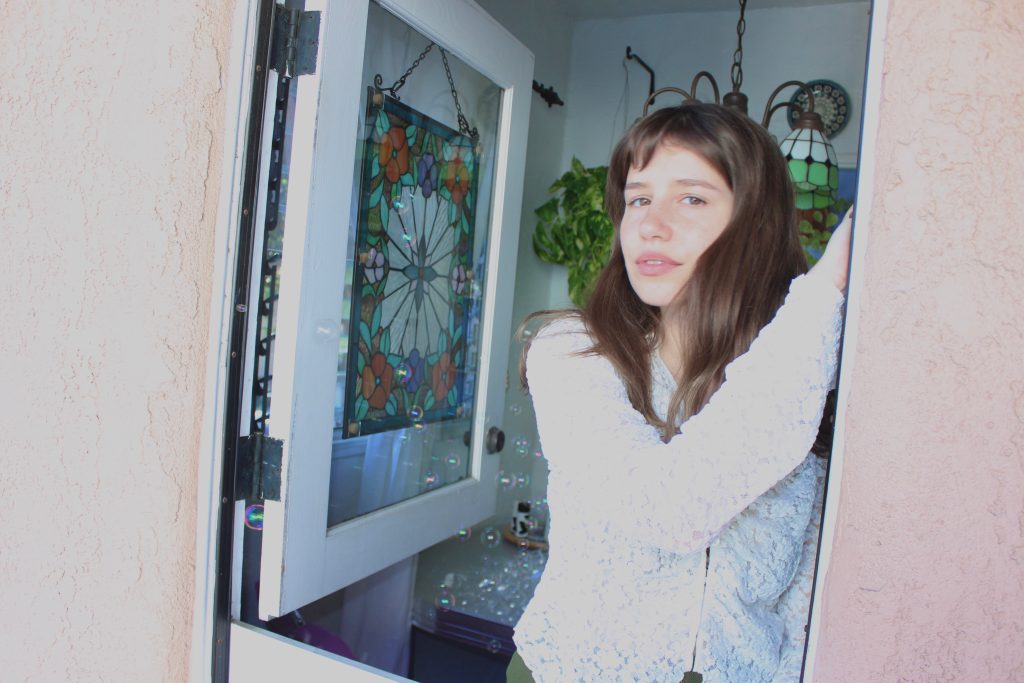
Frankie Cosmos
Different Talking
Rel. Date: June 27th 2025
Different Talking, the sixth and, so far, best album by NYC indie-rock four-piece Frankie Cosmos, seems to exist across time and space, as we all kind of do. It’s a collection of fragments and memories, remembered places, and reinterpreted feelings that adds up to a lucent, humming whole: a sturdy, worldly indie-rock record about aging and the passage of time that nonetheless manages to feel sharply current.
Frankie Cosmos lead singer, guitarist, and songwriter Greta Kline has long been heralded as one of contemporary indie music’s most deft and most necessary writers, but on Different Talking, her lyrics soften out slightly, the wry cynicism that defined recent records now giving way to an acknowledgment of the awesome, and necessary, fallibility of the human brain and heart.
To classify Different Talking as a return to form, or at least a return to the lush directness of earlier Frankie Cosmos records, would be rude but also wholly incorrect: as Different Talking makes clear, you can never return to the comfort and bravery of your early twenties, but that person always kind of lives inside you, no matter how much you change. Different Talking is about finding that person, honoring them, and learning from them. “A lot of the album is about being grown up and figuring out how to know yourself – like, ‘What is moving on?’” says Kline. “How do we move on when we’re addicted to a cycle of haunting our own past? Writing songs is just the way through that.”
Kline has been a fixture of the American indie underground since her late teens when her prolific Bandcamp releases and 2014 indie-label debut Zentropy led her to be dubbed “the poet laureate of New York City DIY.” A tag like that is a lot for young shoulders to take on, but it’s hard to deny the singular influence she has had on contemporary pop music. If the idea of a young woman picking up a synth in her bedroom, putting a couple of songs on the internet, and quickly becoming a superstar is now de rigeur, it’s because Kline – along with a handful of other artists and writers – normalized and exalted ideas of (female) DIY genius long before they were pinned to moodboards in major-label marketing offices.
A lot has changed since then: after going through a handful of different permutations over the past decade, Frankie Cosmos is now a four-piece featuring Kline, Alex Bailey, Katie Von Schleicher, and Hugo Stanley. Kline is the only constant, but Stanley, Bailey, and Von Schleicher are crucial collaborators, and to use the names “Greta Kline” and “Frankie Cosmos” interchangeably would be incorrect. Kline remains the primary songwriter, and the music on Different Talking is arranged by the band as a whole, but this is the first album to be self-tracked by the unit with no external studio producers.
Setting up camp at a house in upstate New York for a month-and-a-half to work on Different Talking, Frankie Cosmos developed the kind of rapport you can only build from living and breathing your art for a long period; they smoothed out kinks in production together and watched films in the evenings, cooked for each other while one member ironed out their parts alone, and took trips into town when they needed a matcha or a breather. Learning each others’ rhythms meant that, with each successive day, they were becoming more of a living, breathing organism as a band, less a collection of musicians building out Kline’s songs than a unit devoted to finding a shared world within each track. This is Frankie Cosmos’s first entirely self-produced album (aside from Kline’s early demos), and, not coincidentally, it feels like a purer, more distilled take on the band. “It does feel like the best version of what I’ve wanted to make since I was a teenager,” says Kline. “Although this was recorded in a living room, it’s as high fidelity as anything we’ve made in the studio.”
This sense of locked-in-ness is clear when you listen to Different Talking, which could only be the work of four accomplished, ambitious musicians working in perfect harmony. Bailey’s antic bass line interlocks seamlessly with Stanley’s brain-scramblingly mathy polyrhythm on “Bitch Heart”; Von Schleicher’s keys perfectly gild Kline’s vocal melody on “One! Gray! Hair!”. Throughout the album, it feels like nothing is extraneous or out of place, everything being controlled from one shared central nervous system. Lyrically, Different Talking may be some of Kline’s most insular work, but musically, it’s the most varied and richly textured Frankie Cosmos album, filled with country-fried noodling and tassels of synth and imposing walls of sound. “We’d go to any length to get Greta’s songs right, and she’s generous with songs, so we have a lot of freedom to arrange them,” says Von Schleicher. “It’s a rare talent to have, with rare freedom given, and the course hasn’t changed.”
Lead single “Vanity” exemplifies this perfectionist’s approach to production and songwriting: Von Schleicher correctly describes it as “a fucking pop anthem”, but does a pop anthem ever contain this much attention to detail? “Vanity” is spare and busy at the same time, its second-album-Strokes chorus blossoming between passages of minimalist curiosity that recall the earliest Frankie Cosmos tapes. It’s one of the songs on Different Talking that doesn’t have a clear object, perhaps a result of its genesis: “I started writing it one evening while I walked (~6.5 miles) from Tompkins Square Park to Sunset Park, speaking directly to the universe and pleading to be considered by it,” says Kline. “It feels like it encompasses this push and pull between adult and kid, government and governed, planet and blade of grass.”
Different Talking opens with “Pressed Flower,” a kind of Rosetta Stone for the rest of the record that touches on gentrification and rebirth, the passage of time, and the idea of “memories being present in the physical world,” says Kline. Wistful but resolute, it perfectly encapsulates Kline’s writing at this moment: Hopeful and world-weary at the same time, looking back on painful older memories with a new sense of resignation and understanding. “I’m constantly both shedding old feelings and reactivating them through the same process of reflection,” says Kline. “I’m looking back at my younger self and feeling both connected and disconnected from her in new ways.”
Sometimes, that sense of connection comes in the ability to make a joke about something traumatic, like when Kline sings “My wonderland keeps the score” on “Wonderland”; you can feel a sense of relief on “Life Back” when she sings that “Yesterday I felt like I would never have my life back/Today I don’t remember ever feeling like that.” Although dissociation is a theme of Different Talking (“Trick my body, near constantly,” sings Kline on “Porcelain”), so is the uncomfortable euphoria of feeling totally embodied. Being aware of yourself becomes an insistent hook on “Bitch Heart”: “I’m watching the goosebumps retract/Watch the hair fall flat against my skin.” “So much of aging for me has involved this growing awareness and learning to be in my body and feel grounded,” says Kline. “I want to try and take in each moment with more focus and thoughtfulness – sometimes that means focusing on a physical body sensation.”
Different Talking ends with “Pothole,” a jaunty, dryly funny obliteration of ego that ends on the kind of ambiguous, optimistic note that’s defined many a Frankie Cosmos song over the years: “It’s sunset here/What’s it for you?/How’d they get the pink light to come out like that?” It’s an invitation and an acknowledgment that the world is just the way that it is, and it’s our job to find meaning within that, as opposed to waiting for meaning to come find us. “It’s kind of like, okay, the world is big and can be beautiful,” says Kline. “Let’s ask questions about it.”

Chris Cohen
Chris Cohen was always a quiet kid. In fact, this introversion was one reason he began playing music as a toddler—to communicate without speaking, to identify with others without the direct representation of words. It has worked, too, with Cohen’s terrific stint in the mighty Deerhoof and his own captivating art-rock act The Curtains preceding production and session work for the likes of Weyes Blood, Kurt Vile, Le Ren, and Marina Allen. Somewhere along that long way, Cohen started writing lyrics. He found that, though it didn’t come naturally, the process offered a new sense of self-discovery and reckoning, a way to see himself and the world from unexpected angles. His three twilit albums of casually complicated pop during the last decade radiated these epiphanies: handling family strife, navigating advancing age, and understanding social woes.
But Cohen has never had as much to sing so directly as he does on Paint a Room, his first album in five years and his debut for Hardly Art. If Cohen’s meanings have previously lurked inside the tessellated musical layers he built alone, they are newly clear and resonant here, animated and underscored for the first time by a band playing in real time. There is the endless miasma of state violence on the subversively melodious opener “Damage,” the existential exhaustion of modernity on the horn-traced jangle “Laughing”: this is Cohen communicating with friends not only through his deep understanding of groove, harmony, and hook but also with his listeners through songs that croon of our uneasy little era.
In the past, Cohen made records in spells of isolation, phases when, as he puts it, he would “try to make my world a lot smaller.” He would play any of a dozen or so instruments until he stumbled upon something interesting, then slowly build upward and outward upon the idea. The method was solitary and stepwise, an act of accretion and deletion.
Cohen, though, has been playing live with bassist Davin Givhan, drummer Josh da Costa, and keyboardist Jay Israelson in some fashion for the better part of a decade. This time around, then, he built demos in the dusty garage of the suburban Altadena rental that smelled like old wood and gasoline and tried something new—he took the songs on tour with that crew, yielding total control by letting them fill in or flourish their own parts as they saw fit. They came back home and began recording as a band.
Cohen even called in a few friends to help, with Jeff Parker contributing the fluttering horn arrangement on “Damage,” and Parker collaborator Josh Johnson (who produced Meshell Ndegeocello’s Grammy-Award-winning album The Omnichord Real Book) supplying flute, sax, and clarinet arrangements throughout the record. It felt a little bit like producing someone else’s records, with Cohen given the chance to step back and evaluate others’ contributions to his own songs rather than scrutinize every little bit he made himself. This was a longtime ambition realized, another way of relating to others openly through sound.
Cohen, really, has never sounded so assured on a solo album, gliding above or sinking into this band that boasts a preternatural sense of feel. On “Damage,” as he surveys the way we lord power over people with less of it in most every walk of life, his voice lifts above Johnson’s horns like he’s looking for a way out. Cohen wrote “Sunever” for a transgender child in his life, while considering the violence that hard-and-fast categories can create. This song reminds us that we are “always in between,” that transitions are just a part of life. With the hook, he sweetly sings his vow: “You’re gonna find a way.” Cohen is tender and vulnerable in the lead, his voice cracking with feeling as the tune presses forward toward a better future. Written by cutting and pasting phrases from the unemployment form he filled out at the pandemic’s start, the frolicking “Physical Address” considers what it is we all want for our lives, how we untether ourselves from the past in the present. On Paint a Room, Cohen’s music feels like a warm spring breeze, easy to love and gentle to feel. But it’s often carrying something heavy, as if blowing in from some unseen storm cloud.
Cohen had another hobby as a kid: transcendental meditation, a practice his parents taught him when he was six. It’s still part of his life, a window into observing his thought processes, habits, and relationship to the rest of the world. Making music—and, turns out, writing lyrics for it—works in a similar way for Cohen, as he’s able to understand and then articulate notions that wouldn’t be so easy with the absolutism of mere words. Paint a Room both reckons with reality and conjures an alternate one, where nighttime walks and a neighbor’s wind chimes offer endless escapes for the imagination, space for the mind to roam. Sublime and sunlit, these 10 songs consider dreamy new ways out of old predicaments, clearly stating the problem and dancing and singing their way somewhere new.

Emily Yacina
Emily Yacina is a Pennsylvania-born Long Beach-based musician and songwriter who began writing and recording songs at age 14. Drawing on making sense of relationships and navigating inner cosmology, Yacina released her first set of songs in 2011 and continued to release batches of EPs over the proceeding years, culminating eventually in her first full length album Heart Sky in 2017 and her first studio album Remember The Silver in 2019.
In 2023, Yacina began working with Rostam Batmanglij to co-produce 2 songs written the previous year. While Trick of the Light is about the role of fantasy in relationships; Nothing Lasts was written after Yacina read Octavia Butler’s Parable of the Sower, inspired by Butler’s idea of God being change.



